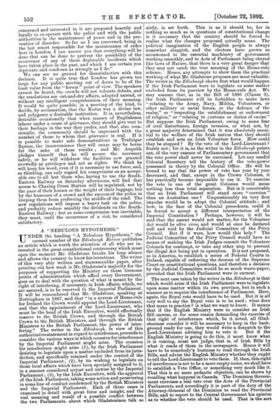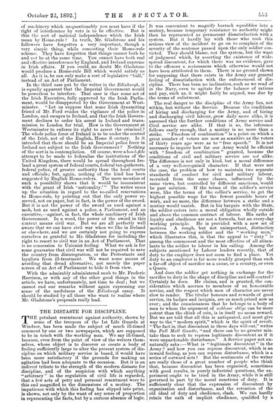A "NEBULOUS HYPOTHESIS."
NDER the heading "A Nebulous Hypothesis," the current number of the Edinburgh Review publishes an article which is worth the attention of all who are in- terested in the great constitutional controversy which must open the moment Mr. Gladstone breaks his long silence and allows the country to know his intentions. The writer of this very ably written and statesmanlike paper, after pointing out how weak is Mr. Gladstone's majority for the purposes of supporting the Ministry on those tiresome points of administration which affect every Government, goes on to deal with the question of what is meant by the right of interfering, if necessary, in Irish affairs, which, we are assured, is to be reserved to the Imperial Parliament. It will be remembered that Mr. Gladstone, speaking at Nottingham in 1887, said that "in a system of Home-rule for Ireland the Crown would appoint the Lord-Lieutenant, and that the appointment of the Lord-Lieutenant, who must be the head of the Irish Executive, would effectually reserve to the British Crown, and through the British Crown to the British Ministers, and through the British Ministers to the British Parliament, the power of inter- fering." The writer in the Edinburgh, in view of this authoritative statement in regard to interference, proceeds to consider the various ways in which occasion for interference by the Imperial Parliament might arise. The occasion for interference might arise (1), by the Irish Parliament desiring to legislate upon a matter excluded from its juris- diction, and specifically retained under the control of the Imperial Parliament ; (2), by its wishing to legislate on those local affairs which have been specially assigned to it, in a manner considered unjust and unwise by the Imperial Parliament ; (3), by the Irish Executive, with the approval of the Irish Parliament, taking some action and persevering in some line of conduct condemned by the British Ministers and the Imperial Parliament. Each of these cases is examined in detail with great force and insight, and the real meaning and result of a possible conflict between the two Parliaments, about which Gladstonians talk so airily, is set forth. This is as it should be, for in nothing so much as in questions of constitutional change is it necessary that the country should be forced to realise what the changes proposed actually mean. The political imagination of the English people is always somewhat sluggish, and the electors have grown so accustomed to the essential machinery of government working smoothly, and to Acts of Parliament being obeyed like laws of Nature, that there is a very great danger that they may not catch the true meaning of the Home-rule scheme. Hence, any attempts to show them the practical working of what Mr. Gladstone proposes are most valuable. The writer in the Edinburgh shows first what would happen if the Irish Parliament were to legislate on some matter excluded from its purview by the Home-rule Act. We may assume that, as in the Bill of 1886 (Clause 3), the Irish Parliament will be forbidden to make laws "relating to the Army, Navy, Militia, Volunteers, or other military or naval forces, or the defence of the realm," or "respecting the establishment or endowment of religion," or "relating to customs or duties of excise." But suppose the Irish Parliament, owing to some fear of civil disturbance, foreign invasion, or what not, by a great majority determined that it was absolutely essen- tial to the welfare of the Irish nation that they should establish and arm an Irish Volunteer force. How could they be stopped ? By the veto of the Lord-Lieutenant Surely not ; for it is, as the writer in the Edinburgh points out, of the very essence of Parliamentary government that the veto power shall never be exercised. Let any candid Colonial Secretary tell the history of the veto-power possessed in theory by the Colonial Office. He will be bound to say that the power of veto has year by year decreased, and that, except in the Crown Colonies, it has practically become impossible to use it. To exercise the veto in one of the great Colonies would mean nothing less than total separation. But is it conceivable that an Irish Parliament will stand more " coercion " than an Australian one ? Unquestionably its very first impulse would be to adopt the Colonial attitude ; and how, in the face of the Colonial precedents, could it be forced to accept a different interpretation of the Imperial Constitution ? Perhaps, however, it will be said that the assent would not matter, for the Volunteer Act would be ultra vires, and would at once be declared null and void by the Judicial Committee of the Privy Council. But if it were, how would this help ? The Judicial Committee of the Privy Council would have no means of making the Irish Judges commit the Volunteer Colonels for contempt, or take any other step to prevent the illegal Act being put in operation. It is not proposed, as in America, to establish a series of Federal Courts in Ireland, capable of enforcing the decrees of the Supreme Court on constitutional questions, and therefore a decision by the Judicial Committee would be so much waste-paper, provided that the Irish Parliament were in earnest.
The next case taken by the writer in the Edinburgh is that which would arise if the Irish Parliament were to legislate upon some matter within its own province, but in such a manner as to require the interference of Parliament. Here, again, the Royal veto would have to be used. But it is all very well to say the Royal veto is to be used ; what does that mean in practice ? is what we want to know. It means that if the English Ministry were to consider an Irish Bill unwise, or for some reason demanding the exercise of that right of interference which, be it noted, all Glad- stonians consider it will be necessary to keep in the back- ground ready for use, they would write a despatch to the Lord-Lieutenant advising him to veto it. But if the English Ministry is going to do this, it must know what it is vetoing, must not judge, that is, of Irish Bills by what it reads of them in the newspapers. Hence it will have to be somebody's business to read through the Irish Bills, and advise the English Ministry whether they ought to tell the Lord-Lieutenant to veto them. If, then, this right of interference is not to be a mere empty name, we shall have to establish a Veto Office, or something very much like it. That this is no mere pedantic objection, can be shown by recalling what happens in Canada. The Dominion Govern- ment exercises a real veto over the Acts of the Provincial Parliaments, and. accordingly it is part of the duty of the Attorney-General of the Dominion to read the Provincial Bills, and to report to the Central Government his opinion as to whether the veto should be used. That is the sort of machinery which unquestionably you must have if the right of interference by veto is to be effective. But is this the sort of national independence which the Irish mean by Home-rule ? In truth, Mr. Gladstone and his followers have forgotten a very important, though a very simple thing, while concocting their Home-rule scheme. They have forgotten that things cannot both be and not be at the same time. You cannot have both real and effective interference by England, and Ireland supreme in Irish affairs. If you could, no doubt Mr. Gladstone would produce a Home-rule Bill which would satisfy us all. As it is, he can only make a sort of legislative "bull," instead of an Act of Parliament.
In the third case put by the writer in the Edinburgh, it is equally apparent that the Imperial Government would be powerless to interfere. That case is that some act of the Irish Executive, fully approved by the Irish Parlia- ment, would be disapproved by the Government at West- minster. "Let us suppose that some Irish dynamiting friend of Mr. Ford evades the vigilance of the police in London, and escapes to Ireland, and that the Irish Govern- ment declines to order his arrest in Ireland and trans- mission to London for trial. How is the Government at Westminster to enforce its right to arrest the criminal? The whole police force of Ireland is to be under the control of the Irish, not of the English, Home S.cretary. Is it intended that there should be an Imperial police force in Ireland not subject to the Irish Government ? Nothing of the sort is in contemplation. Of course, were a bond-fide attempt to be made to federalise the institutions of the United Kingdom, there would be spread throughout Ire- land a great system of federal courts, federal tax-gatherers, federal police, of greater authority than the local courts and officials ; but, again, nothing of the kind has been suggested by English Home-rulers. The mere mention of such a possibility shows that it would be inconsistent with the grant of Irish 'nationality.'" The writer sums up the situation in regard to the so-called reservations to Home-rule, by pointing out that the only power re- served, not on paper, but in fact, is the power of the sword. But it is not the power of the sword as used against a mob, but as used against a police, a Parliament, and an executive,—against, in fact, the whole machinery of Irish Government. In a word, the power of the sword in this context means civil war. But we are all perfectly well aware that we can have civil war when we like in Ireland or elsewhere, and we are certainly not going to express ourselves as grateful to Mr. Gladstone for including the right to resort to civil war in an Act of Parliament. That is no concession to Unionist feeling. What we ask is for some guarantee that civil war will not be required to save the country from disintegration, or the Protestants and loyalists from ill-treatment. We want some means of avoiding that dread alternative, not merely the paper screen of an Act of Parliament to hide it from view.
With the admirably administered snub to Mr. Frederic Harrison, or with any of the other good things in the article, we have, unfortunately, not time to deal ; but we cannot end our remarks without again expressing our sense of the usefulness of the Edinburgh essay. It should be studied by all those who want to realise where Mr. Gladstone's proposals really lead.







































 Previous page
Previous page